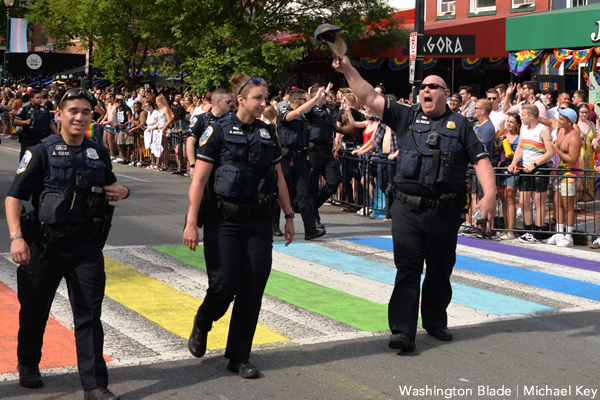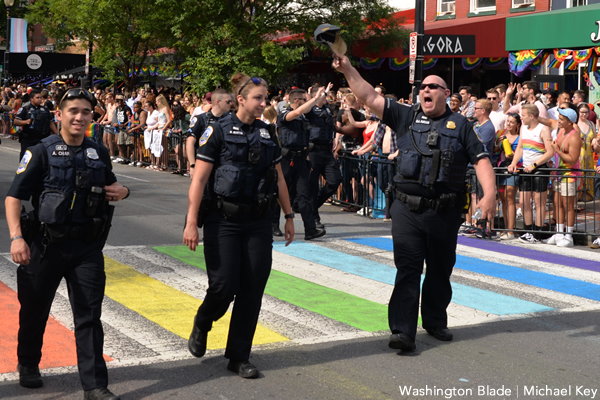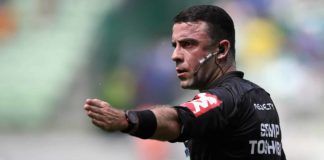
The Capital Pride Alliance, the group that organizes D.C.’s annual LGBTQ Pride events, says it adopted a policy in 2018 to ban uniformed D.C. police officers from marching in the Capital Pride Parade.
Some LGBTQ community members contacted by the Washington Blade, including D.C. Black Pride organizer Earl Fowlkes, have said they were unaware of the Capital Pride policy of not allowing police participation in the parade and other Capital Pride sponsored events.
Fowlkes, who serves as executive director of the D.C.-based Center for Black Equity, which supports Black Pride events throughout the country, said D.C. Black Pride has had police presence at some of its events over the past 30 years and has no plans to ban police from its activities.
Ryan Bos, the Capital Pride Alliance executive director, sent the Blade a statement he said Capital Pride posted on its website in June of 2020 formally announcing the police policy. The statement came five days after an earlier statement posted on the group’s website expressing strong solidarity with the Black Lives Matter movement.
“In 2018 the decision was made that MPD [D.C. Metropolitan Police Department] would not participate as a contingent in the Pride Parade, and has not since,” says the statement, which was posted on June 8, 2020. “Going forward, CPA will not permit any uniformed and armed police officers to march in the Pride Parade or participate in CPA-sanctioned events,” the statement continues.
“As required by the city government, MPD has jurisdiction to close and clear the streets,” the statement says. “The MPD will continue to manage street closures as outlined in permit requirements. When needed, CPA will hire private security as has been done previously.”
The statement concludes by saying Capital Pride Alliance was committed to having “further talks with its LGBTQ+ partners and other organizations and the city to address the on-going concerns that have been raised by the community.” It adds that Capital Pride Alliance “will take additional actions in the coming days and weeks.”
Although the statement did not say so directly, it was referring to the earlier statement discussing Capital Pride’s support for the nationwide protests in June 2020 over the murder of Minneapolis resident George Floyd at the hands of a police officer who was later convicted of second-degree murder and manslaughter for Floyd’s death.
“Pride this year comes on the heels of a global pandemic and a nation confronting the murder of George Floyd at the hands of Minneapolis police officers,” the earlier statement posted on June 3, 2020, says.
“This horrific tragedy, and the murders of Breonna Taylor, Tony McDade, and Ahmaud Abrery by police and white vigilantes, have created a nationwide uprising crying out for racial justice and the protection of Black life,” the statement says.
“As members of the Black and Brown communities have stood with the LGBTQ+ community, the Capital Pride Alliance stands in complete solidarity to unite against those disparities that impact communities of color,” says the statement. “We pledge that we will work together to find solutions and make the positive changes that are so desperately needed to end inequity, injustice, and violence against people of color.”
In prior years, uniformed members of the D.C. police LGBT Liaison Unit have marched as a contingent in the Capital Pride Parade. During some prior years going back to the 1990s, D.C. police chiefs have joined the parade in police vehicles or watched the parade while standing along the parade route.
D.C. police spokesperson Dustin Sternbeck did not respond to a request by the Blade for comment on the Capital Pride policy of banning uniformed police participation in Pride events.
Gay retired D.C. Police Lt. Brett Parson, who served as director of the department’s Special Liaison Branch, which oversees the LGBT Liaison Unit, declined to comment on the Capital Pride ban on D.C. police participation.
Some LGBTQ activists have expressed the view that D.C. police participation in Pride events, especially participation by high-level police officials, was a sign of the D.C. police department’s strong support for the LGBTQ community.
But other activists, including members of the local transgender community, have said police crackdowns on sex workers, including transgender female sex workers of color, have involved what they believe to be a misplacement of police priorities. The local transgender and sex worker advocacy group No Justice No Pride has long called on Capital Pride to ban police from participation in all Pride-related events.
In the years since Capital Pride adopted its police policy, other cities, including Seattle, Denver, and just last week New York City’s Pride organization adopted policies banning police participation in their Pride parades and other Pride events.
Bos of Capital Pride said that similar to last year, due to COVID restrictions in place earlier this year, the traditional D.C. Pride Parade and festival will not be held in June this year. Although D.C. Mayor Muriel Bowser earlier this month removed all restrictions on large outdoor events beginning June 11, Bos said Capital Pride did not have time to organize a parade and festival for June. He said a Capital Pride Parade and festival are under consideration for October of this year.
The Capital Pride website includes information about a number of smaller Pride events for June, both in-person and virtual events. Among them will be a caravan of cars and vehicles decorated with Pride displays scheduled to travel across the city on June 12 to view houses and businesses that will display Pride decorations on their buildings or in their front yards.
Fowlkes said D.C. Black Pride organizers also fully support the Black Lives Matter movement and have condemned the incidents of police abuse, including the George Floyd murder in Minneapolis. But he said Black Pride organizers see no reason for banning police participation, especially the LGBT police officers who regularly attend Black Pride events.
“We’ve never had a problem,” he said. “Our members have never voiced a problem in dealing with the police,” according to Fowlkes.
“We know a lot of queer police officers and I welcome their presence,” Fowlkes said. “As long as they behave, I welcome everyone’s presence. It’s open to everybody. I can’t see eliminating the police any more than if people come in an Army uniform.”
David Johns, executive director of the D.C.-based LGBTQ group National Black Justice Coalition, has taken a different position than that of Black Pride.
“The D.C. Capital Pride Alliance was right to ban uniformed police from participating in the Pride Parade when it made its decision back in 2018,” Johns told the Blade in a statement. “For too many members of the LGBTQ+ community, especially Black LGBTQ+ and same-gender loving people, the presences of armed, uniform police make us feel less safe,” he said.
“It is important that the D.C. Capital Pride Alliance recognized that the struggle for civil rights for all must uplift all parts of us all of the time – including Black LGBTQ+ people who have too often been sidelined or excluded from the important discussions facing our community,” Johns said.
In yet another indication that the LGBTQ community is divided on the police issue, Washington Post columnist Jonathan Capehart, who’s gay and African American, wrote a column published in the Post on Monday expressing strong disagreement with the New York City Pride organization’s decision last week to ban LGBTQ police officers from marching in the New York Pride parade next month.
Capehart wrote that he fully understands the concerns over police abuse in New York and other cities in the past and in recent times. But he said he believes the New York Pride organizers made a “really bad call” in banning the NYPD Gay Officers Action League or GOAL from marching in this year’s parade.
“If you’ve been to a pride parade, you know it’s a celebration of acceptance and inclusion,” said Capehart in his column. “That’s why it’s beyond troubling that a community made up of so many who’ve been rejected by their families because of who they are is now turning on its own members because of what they do for a living,” he states. “This is wrong. This is shortsighted. This is a mistake.”








